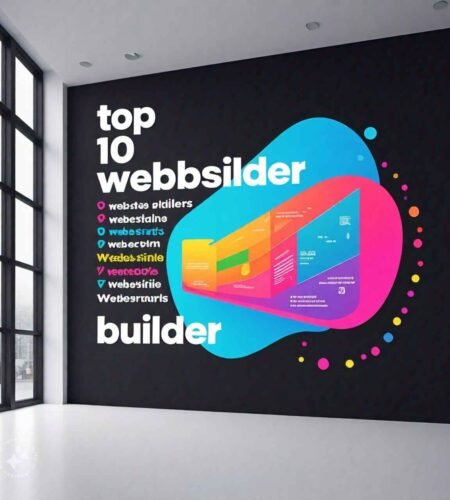The rise of artificial intelligence (AI) has transformed many industries, and website creation is no exception. AI website makers allow users to build professional-looking sites without needing extensive coding or design skills. This article explores the top 10 AI website builders available in 2025, highlighting their features, benefits, and ideal use cases.
Table of Contents
1. Wix AI Website Builder
Overview: Wix is renowned for its user-friendly interface and powerful features. Its AI website builder utilizes artificial design intelligence (ADI) to create customized websites quickly.
Key Features:
- Customizable Templates: Users can choose from a wide range of templates tailored to various industries.
- AI Suggestions: The AI provides suggestions for pages and layouts based on user input.
- Integrated Tools: Includes SEO tools, marketing features, and eCommerce capabilities.
Best For: Small businesses and startups looking for a hassle-free website creation experience.For more information, visit Wix.
2. 10Web AI Website Builder
Overview: 10Web integrates with WordPress to offer an automated website-building experience that replicates existing sites.
Key Features:
- Website Replication: Users can enter the URL of a site they admire, and 10Web will recreate it on WordPress.
- Performance Optimization: The platform includes tools to enhance speed and SEO.
- Plugin Access: Offers over 50 premium WordPress plugins for added functionality.
Best For: Businesses that prefer the flexibility of WordPress and need a quick setup.Learn more at 10Web.
3. Bookmark Website Builder
Overview: Bookmark leverages its AI tool, Aida, to create websites with minimal user input.
Key Features:
- Instant Creation: Users can generate a fully functional site in minutes by answering a few questions.
- E-commerce Support: Includes features tailored for online stores.
- Mobile Optimization: Automatically ensures websites are mobile-friendly.
Best For: Individuals and small businesses needing a quick and easy solution. Explore Bookmark at Bookmark.
4. Jimdo Website Builder
Overview: Jimdo’s AI website builder is designed for eCommerce, enabling users to create online stores effortlessly.
Key Features:
- E-commerce Focused: Built-in tools for product management and payment processing.
- SEO Tools: Helps optimize sites for search engines.
- User-Friendly Interface: Simple setup process suitable for beginners.
Best For: Entrepreneurs looking to establish an online store quickly.Visit Jimdo at Jimdo.
5. Dorik Website Builder
Overview: Dorik stands out with its unique features, including an AI image generator that creates visuals based on user prompts.
Key Features:
- Custom Site Creation: Users can build websites from scratch with just a description of their business.
- Multi-language Support: Offers language generation capabilities.
- Real-time Editing: Changes are reflected instantly as users build their site.
Best For: Creative professionals seeking customization options without technical skills.Check out Dorik at Dorik.
6. GetResponse Website Builder
Overview: GetResponse offers a robust platform that combines email marketing with website building.
Key Features:
- Drag-and-Drop Functionality: Intuitive interface allows easy customization.
- Marketing Integration: Seamlessly integrates with email marketing tools.
- Responsive Design Templates: Ensures sites look great on all devices.
Best For: Businesses looking to combine marketing efforts with web presence.Learn more about GetResponse at GetResponse.
7. Durable Website Builder
Overview: Durable focuses on providing quick website setups tailored for small businesses and freelancers.
Key Features:
- Fast Setup Process: Create a professional site in minutes.
- Business Tools Integration: Includes essential tools like booking systems and contact forms.
- User-Friendly Interface: Designed for users without technical backgrounds.
Best For: Freelancers or small businesses needing an efficient online presence.Explore Durable at Durable.
8. Hostinger Website Builder
Overview: Hostinger combines web hosting with an AI-driven website builder that simplifies the creation process.
Key Features:
- AI Copywriting Tool: Assists in generating content for websites.
- Logo Maker Integration: Helps users design logos alongside their websites.
- Affordable Pricing Plans: Offers budget-friendly options for startups.
Best For: Budget-conscious users looking for an all-in-one solution.Visit Hostinger at Hostinger.
9. Shopify
Overview: Shopify remains a leader in eCommerce solutions, now enhanced with AI capabilities for streamlined store creation.
Key Features:
- Comprehensive E-commerce Tools: Supports product listings, payment processing, and inventory management.
- AI Product Recommendations: Enhances customer experience through personalized suggestions.
- Extensive App Marketplace: Access to numerous integrations to extend functionality.
Best For: Businesses focused on building robust online stores quickly.Learn more about Shopify at Shopify.
10. Squarespace Website Builder
Overview: Squarespace is known for its stunning design templates and user-friendly interface, now enhanced with AI features.
Key Features:
- Design Flexibility: Offers beautiful templates that are customizable without coding skills.
- Built-in Analytics Tools: Provides insights into site performance and user engagement.
- E-commerce Capabilities: Supports online sales with integrated payment options.
Best For: Creative professionals and businesses wanting visually appealing websites.Explore Squarespace at Squarespace.
Conclusion
The landscape of website creation has evolved significantly with the introduction of AI technology. These top 10 AI website makers provide diverse options tailored to different needs—whether you’re a small business owner, freelancer, or entrepreneur looking to establish an online presence quickly. Each platform offers unique features that cater to various skill levels and requirements, making it easier than ever to create a professional website without extensive technical knowledge.As you consider which AI website maker suits your needs best, think about your specific requirements—such as eCommerce capabilities, design flexibility, or integration with other tools—and explore the platforms further through their respective links provided above. Learn More
Subscribe to our email newsletter to get the latest posts delivered right to your email.
